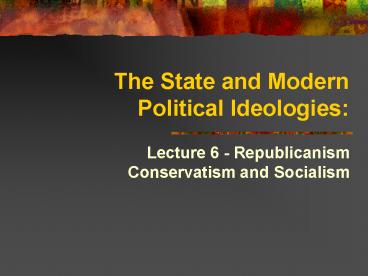The State and Modern Political Ideologies: - PowerPoint PPT Presentation
1 / 16
Title:
The State and Modern Political Ideologies:
Description:
4. The Utopia: New Collectivist Economic and Political System ... b) Free Education, Health care. c) Possible Abolition of Family. d) Redistribution of Income ... – PowerPoint PPT presentation
Number of Views:547
Avg rating:3.0/5.0
Title: The State and Modern Political Ideologies:
1
The State and Modern Political Ideologies
- Lecture 6 - Republicanism Conservatism and
Socialism
2
Outline
- I. Republicanism
- A. Definition
- B. Historical Origins and Key Texts
- C. Main Tenets
- D. Republicanism today
- II. Conservatism
- A. Definition
- B. Key Texts
- C. Main Tenets
- D. Neo-Conservatism
- III. Socialism
- A. Definition
- B. Key Texts
- C. Main Tenets
- D. Socialism today
3
I. Republicanism
- Republicanism A Definition
- An ideology which rejects tyrannical forms of
government and embraces civic virtue and the
citizen as central to political life.
Republicanism emphasizes the organic and
transcendent nature of the republic along with
duty to country.
4
I. Republicanism
- B. Historical Origins and Key Texts
- Greeks - Platos Republic transcend individual
good - Roman Res publica Everything public
- Focus is on virtue of citizens
- Ward off corruption, tyranny and factionalism
- Freedom from tyranny of other states
- Mixed constitution - Consuls, Senate, Assemblies
- Renaissance Revival of Classical Republicanism
- Machiavelli - Defense of Republic (mixed
constiution) - Monarchy is consistent with republican ideals
5
I. Republicanism
- Modern Republicanism (18th Century)
- Jean Jacques Rousseau Social Contract 1762
- Defends general will of people
- Popular sovereignty
- American Revolution (1776)
- Anti-monarchical, emphasizes the people and
rule of law - Emphasizes civic virtue/duty
- Preferable to Liberalism and Democracy
- No foundational religion - separation of church
and state - Enormous debate - is America liberal or
republican? - Immanuel Kant Perpetual Peace 1795
- State is either republican (rule of law) or
despotic - Perpetual peace requires that the constitution
of every country be republican.
6
I. Republicanism
- D. Main Tenets
- Civic Virtue and Duties of Citizens are Key
- Factionalism must be avoided - republic is
indivisible - Fear of Corruption
- Rule of law
- Anti-monarchical
- E. Republicanism Today
- French Republic
- Anti-factionalism, secularist, anti-monarchical
- American Republican party
- Neo-conservative, emphasis on duty, and service
to the people - Moral language emphasized/link to religion
7
II. Conservatism
- A. Conservatism A Definition
- An ideology which views political hierarchy and
inequality as natural, wishes to avoid
large-scale or radical change, and ultimately
seeks to conserve tradition, maintain existing
institutions and defend general law and order.
8
II. Conservatism
- B. Key Texts of Conservatism
- Edmund Burke Reflections
- on the Revolution in France (1790)
EDMUND BURKE
9
II. Conservatism
- C. Main Tenets of Conservatism
- 1. Anti-Romantic/Revolutionary/Republican
- 2. Organic View of Society
- 3. Conservation of Tradition
- 4. Skepticism of Change
- 5. Pessimistic View of Human Nature
- 6. Belief in Law and Order
- 7. Inequality and Hierarchy are Good
- 8. Emphasis on Duties rather than Rights
10
II. Conservatism
- D. Neo-Conservatism (1980's -
- 1. Definition An ideology which brings together
a belief in fiscal conservatism (return to
classical liberalism) with a social conservatism
(return to traditional notions of social and
political morality). - 2. Fiscal Conservatism
- a) Minimal gov't intervention in market
- b) Maximize private sector
- c) Decrease social spending/taxes
11
II. Conservatism
- D. Neo-Conservatism (1980s -
- 3. Social Conservatism
- a) State's control functions strengthened
- i) Increased Police powers
- ii) Tough on Crime - Focus on victims
- b) Increase in military expenditure
- c) Pro traditional family values
- Definition of marriage
- Tax laws re stay at home spouse
- d) Christian Right
- i) Abortion
- ii) Capital Punishment
- iii) Anti Gay and Lesbian
12
III. Socialism
- A. Socialism A Definition
- An ideology which believes that capitalism (as an
economic system which creates poverty, alienation
and inequality for the vast majority of people)
must be replaced or modified by a more
egalitarian economic system which would include
common ownership of production, free education,
healthcare and social services.
13
III. Socialism
- B. Key Texts of Socialism
- Karl Marx, Communist Manifesto, 1848
- Eduard Bernstein, Evolutionary Socialism, 1899
14
III. Socialism
- C. Main Tenets of Socialism
- 1. Economics/Technology Determines History
- Dialectical Materialism (Marx)
- What do people do? Material base
- How do they justify it? Superstructure
- 2. Class Conflict in Society
- 3. Capitalism Must be Replaced or Modified
- Poverty
- Inequality between people
- Alienation of workers
15
III. Socialism
- C. Main Tenets of Socialism
- 4. The Utopia New Collectivist Economic and
Political System - a) Communal Ownership of Production
- b) Free Education, Health care
- c) Possible Abolition of Family
- d) Redistribution of Income
16
III. Socialism
- D. Socialists in the 20th Century
- 1. Marxists
- 2. Socialists
- 3. Social Democrats

